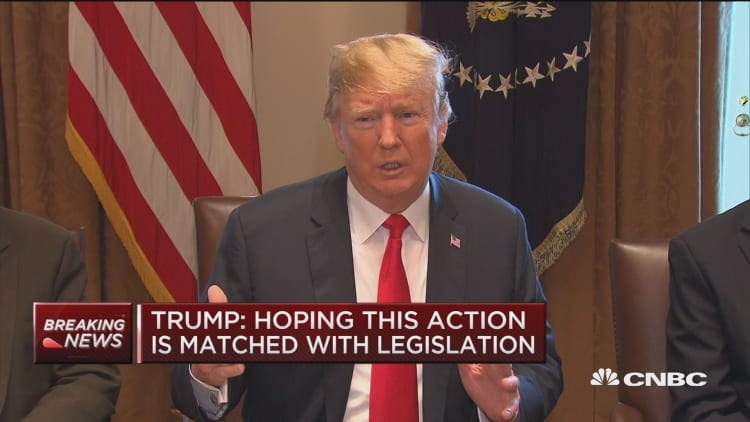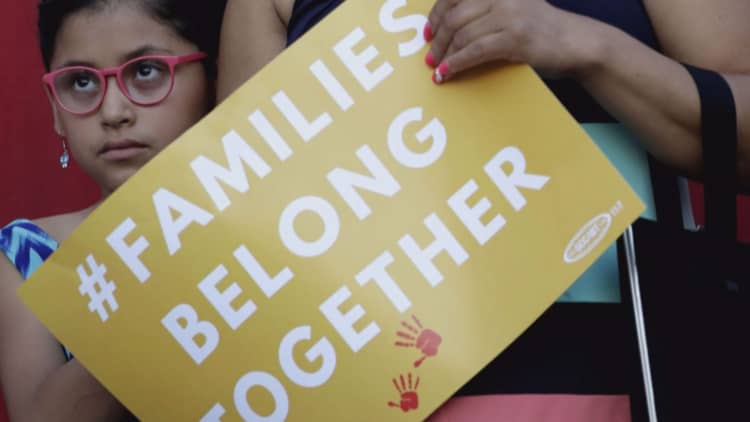When President Donald Trump announced Wednesday he would sign an executive order stopping the separation of families at the U.S.-Mexico border, he acknowledged that it was a far cry from a comprehensive immigration fix.
"I'll be doing something that's somewhat preemptive, but ultimately will be matched by legislation," Trump told reporters at the White House.
Attorney General Jeff Sessions' hard-line "zero tolerance" directive in April to prosecute all cases of illegal entry into the U.S., in concert with existing law, has led to the separation of some 2,000 migrant children from their families between April 19 and the end of May, according to the Department of Homeland Security.

The policy has roiled Washington, enraged Democrats and opened up a rift between the White House and many Republicans. It has also prompted a heated bout of finger-pointing, as administration officials and some lawmakers claimed that the other governmental branch was the only one capable of solving the problem.
As Capitol Hill continues to wrestle over a legislative solution, immigration experts offered their own thoughts about reforming U.S. immigration policy — in the short- and long-term.
Rescind zero tolerance
The predominant view among immigration experts is that the situation on the border can be improved immediately by rescinding Sessions' zero tolerance policy.
"The immediate thing they could do is roll back the April memo from Sessions," said Theresa Cardinal Brown, director of immigration and cross-border policy at the Bipartisan Policy Center.
The executive order signed Wednesday was intended to keep families together without sacrificing the policy to prosecute all illegal entrants over the border.
"We are going to have very strong borders, but we are going to keep the families together," Trump said.
Hiroshi Motomura, a professor of law at UCLA specializing in immigration, agreed with Brown that Sessions' April memorandum should be removed.
"The administration adopted this policy. They can change their mind" on zero tolerance, Motomura said. "There's nothing in the law that requires the administration to do this."
Andrew Arthur, a resident fellow in law and policy at the Center for Immigration Studies, said one of the main problems with the current system is that the Department of Health and Human Services has "neither the capacity nor ability" to take custody of children who have been separated from their parents.

Failing a full repeal of zero tolerance, Motomura said the Trump administration could improve the situation by releasing some detained immigrants on bond, as he says happened in certain cases under the Obama administration.
"The number of cases where people abscond is lower than some have said," Motomura added.
That's unlikely to be considered a viable option for Trump, who has been a leading critic of so-called "catch and release" practices in which immigrants are released pending trial.
To be sure, some experts agree with the administration's view that to prosecute all immigrants illegally crossing the border is a necessary step to uphold the law.
"Illegal entry is a crime. Anyone who comes here illegally is subject to being prosecuted," Arthur said.
More aid, not less
While arrests at the southern border fell dramatically in fiscal year 2017, the makeup of arriving migrants now includes a much larger proportion of families and children than it has in the past.
The Trump administration has said existing U.S. laws provide a perverse incentive for traffickers and smugglers to bring children to the border.
Brown, of the Bipartisan Policy Center, had a different fix in mind to address the same problem: hiring more judges.
She said that there are far too few immigration judges tackling far too many cases, which leads to a backlog that can leave immigrants waiting for years.
"We'd be much better figuring out how we can process these cases much more quickly," she said.
Leon Rodriguez, who directed U.S. Citizenship and Immigration Services at the Homeland Security Department during President Barack Obama's second term, said that the "real issue" encouraging immigration to the U.S. has to do with the conditions of the countries people are fleeing.
"Let's look at Honduras — insanely high homicide rate, large gang rates, complete inability of civil authority," Rodriguez said.
"Until that shifts, we're still going to see migration," he said. "I don't care how high the wall is, I don't care who we separate. History has taught that over and over and over again."
He pointed to Mexico as an example of a country whose rates of U.S. migration declined as its economy grew. While the raw number of Mexican immigrants to the U.S. remains the highest, it fell 6 percent from 2007 to 2015, according to Pew Research Center.
Meanwhile, those coming from Central American countries reportedly outpaced growth from any other region in the same time period. Providing more assistance to these countries could help stem the flow of illegal immigration by eliminating the need for their populations to seek a better life elsewhere, Rodriguez said.
It's an argument that may not resonate with Trump, who on Tuesday said he wants to cut off foreign aid to countries that "abuse" the United States.
"I just don't think enforcement is a real solution," Rodriguez said. "It's somewhere between a placebo and a band-aid."
WATCH: Trump urges GOP to pass immigration bill



